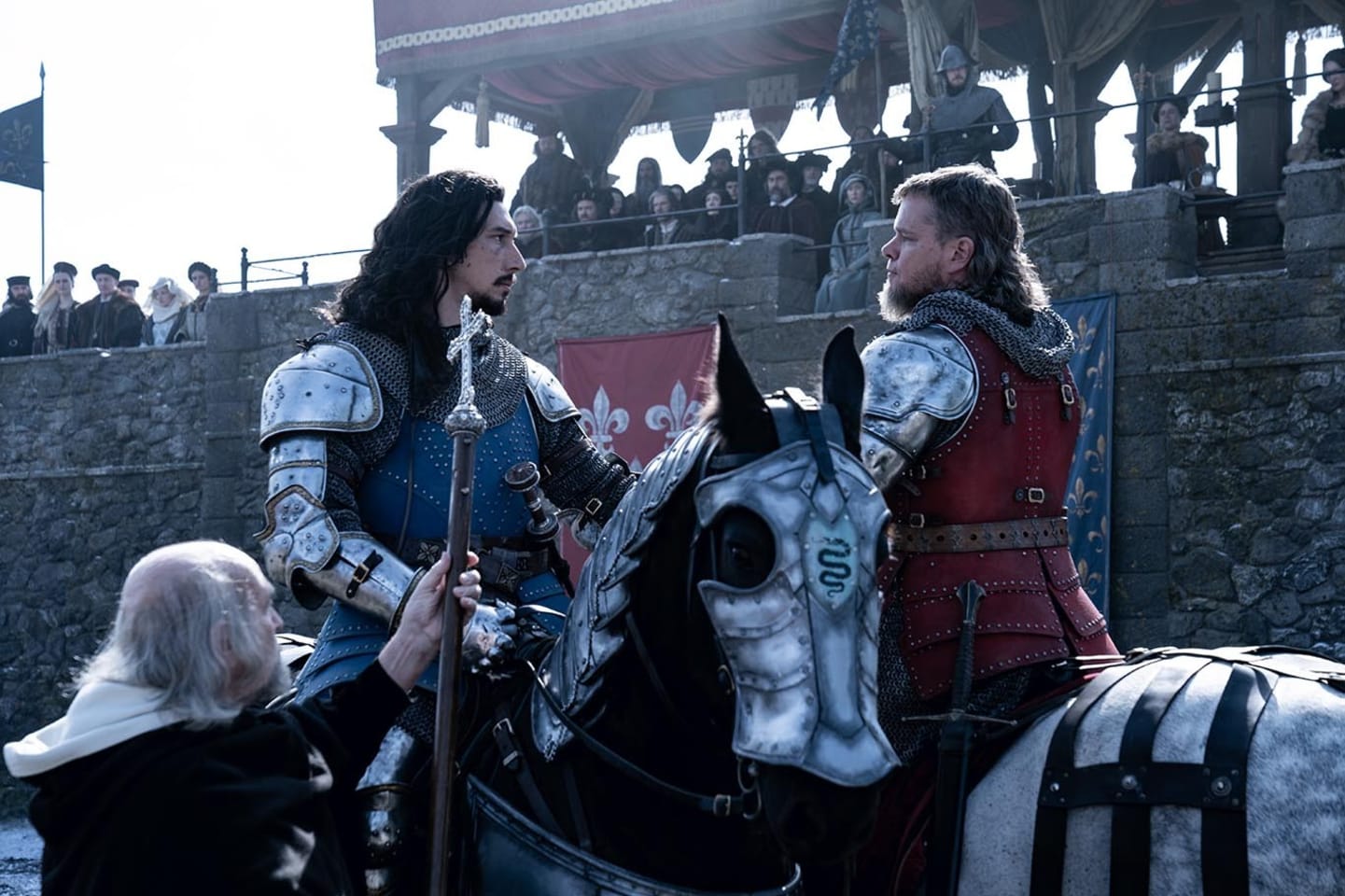On October 15, director Ridley Scott returns with his latest historical epic, The Last Duel. From the trailers, it looks like it might be sword and shield-swinging action-adventure movie – and there are moments of brutal fighting – but it’s far more than that. It’s based on the 2004 book The Last Duel: A True Story of Trial by Combat in Medieval France by Eric Jager. As one might have guessed by the title, that itself is based on a true story, the story of the last legally-sanctioned duel in France in 1386. Shockingly, it was a duel between two men who had once been fast friends.
Their Early Days As Squires

The story begins with those two friends: Jean de Carrouges IV, son of Sir Jean de Carrouges III and his wife Nicole de Buchard, a family of soldiers and minor nobility. Jean was hot-headed and impulsive, but a fierce and talented warrior whose loyalty was unquestionable. Jacque le Gris was born in slightly less elevated circumstances as the son of Guillaume Le Gris, a minor normal squire. In a rarity for the time, le Gris was educated and taught to read and write, as well as math – not having been born into wealth like de Carrouges, the Church was the easiest path for him.
But le Gris soon learned the Church’s demands of abstinence didn’t suit his appetites and he left, joining the military ranks of Robert of Alençon, the Count of Perche as first a man-at-armsk then a squire. Following in his father’s foosteps, Jean also became a squire of the count, as was fitting of the family name of de Carrouges. It was there that he and Jean de Carrouges met and, hit it off as an odd couple. Jean was hard-headed, stubborn, and somewhat uncouth, but a nobleman whose father and family name were well-respected. Jacques was amiable and charming, but prone to womanizing and flattery. Still, the two became fast friends as they fought in multiple campaigns together – so close, in fact, that they became neighbors with le Gris having been gifted one of his liege lord’s castles. When de Carrouges’ first wife, Jeanne, gave birth to a son, it was le Gris whom de Carrouges made his son’s godfather. It was a considerable honor and responsibility at a time in which people were prone to dying young, particularly those who fought on the front lines as often as de Carrouges.
The two friends rose up in esteem together, being welcomed into the Count of Perche’s court, but things took a turn in 1377, the same year that Jean had made Jacques his son’s godfather, when Robert of Alençon died and his younger brother, Pierre, took over and moved the court to Argentan. It was during the time at Argentan that the friendship between de Carrouges and le Gris started fraying and then deteriorating, and it fractured further when de Carrouges’ wife and son died, severing the familial tie between them.
Fractures Start To Form In Their Friendship

It was made worse by the way each was treated by Count Pierre. As a loquacious charmer, le Gris’ literacy skills endeared him to the new count (not to mention they both shared an appetite for women), while de Carrouges was regularly overlooked by the new count, who disliked de Carrouges’ rough ways and obstinancy. There was a stark difference in how the two men saw court: de Carrouges hated all the false flattery and pointless intrigue, while le Gris rightly understood that for a man born of low stature like him, getting good at the political game was the only way to get ahead. Fractures began to form as le Gris saw de Carrouges’ temper as embarrassing and uncouth, and de Carrouges saw le Gris as nothing more than a sycophant. Still, le Gris tried to do what he could to help de Carrouges find favor with the count but de Carrouges was his own worst enemy.
About a year into them joining the court at Argentan, de Carrouges left for battle again to Upper Normandy, looking to make some money as losing his heir and the plague carrying off half his servants had bankrupt him. While de Carrouges fought for King Charles V and made a name for himself, le Gris made a name of a different sort for himself, rising steadily through the ranks of Pierre’s court after he made himself invaluable thanks to his literacy skills and way with numbers. As his fortunes rose, de Carrouges’ fell, and the first major public falling out the friends had came in 1381 when Count Pierre gifted Jacques the land of Arnou-le-Faucon.
As it turns out, this land had technically been promised to Jean, who came back from battle with a new wife, Marguerite de Thibouville, the daughter of a minor noble who, until recently, had owned the fertile lands of Arnou and who had promised them to de Carrouges as part of his dowry. Before de Carrouges returned home, however, the nobleman was forced to sell the land to Count Pierre to make up a debt, and the count gifted the land to le Gris. De Carrouges’ reaction upon learning of what had transpired was fury, and he immediately sued Count Pierre for what he saw as a betrayal and land that was rightfully his – no matter that the Count of Perche had more money, more power, and technically could do what he wanted.
The result was that de Carrouges and his new bride, Marguerite, were thrown out of court. The next three years were spent in legal disputes between de Carrouges and the count. Le Gris’ heavily involved as Seigneur of Arnou-le-Faucon and adviser to the count did not earn him any favor with de Carrouges, who accused le Gris of orchestrating his legal troubles.
Despite the bitterness, the two somewhat buried the hatchet for the sake of peace in 1384, when both attended a celebration at the estate of Jean Crespin to honor the birth of his son. It was there that de Carrouges introduced his new wife in public for the first time and Marguerite de Carrouges made the acquaintance of le Gris. Le Gris was immediately smitten by the educated, well-read Marguerite, who, like him, spoke multiple languages and seemed a poor fit for the illiterate, rough-hewn de Carrouges. Shortly after, de Carrouges once again left for battle, this time in Scotland, and upon his return to Argentan to collect his earnings, had another public fight with le Gris in the middle of court, breaking the temporary and fragile truce they’d had.
The Rape of Marguerite & Sham Trial

The important part happened during that fight: It’s unclear exactly what words were exchanged during the fight, but what is certain is that de Carrouges, now a full knight, let it be known that he was departing for Paris. Shortly thereafter, on the morning of January 18, 1386, de Carrouges’ mother, Dame Nicole de Carrouges departed her chateau on legal business, taking all or most of the servants with her and leaving Marguerite unattended. What happened on that day changed the lives of everyone involved.
According to Marguerite, a few hours after the dame departed, she heard a knock on the door and opened the slider to see man-at-arms Adam Louvel standing there. Louvel made inquiries about a loan he supposedly owned her husband and asked to be let in. Reluctantly, Marguerite allowed him in – only to find Jacques le Gris right behind him. It had all been a ruse to get le Gris alone with Marguerite to declare his love of her. Despite Marguerite’s protests and requests for him to leave, le Gris refused and propositioned her, even offering her money to keep quiet. When Marguerite refused, le Gris chased her down and violently raped her, telling her not to tell anyone before departing.
Marguerite kept her ordeal to herself for a few days until de Carrouges returned from Paris, at which point she told him of what le Gris had done to her. De Carrouges spread the word far and wide to get a hearing from Count Pierre, but both he and Marguerite knew they’d never get a fair trial with le Gris being such a favorite. In fact, they were so certain of it, neither of them bothered to attend what they called a sham trial. They weren’t wrong. Not only was le Gris acquitted of all charges, but Pierre even accused Marguerite of “dreaming” up the attack in her absence.
The Trial in Front of the King & Duel

But de Carrouges was undeterred. At the time, rape was not considered a criminal act against a woman, but an act of theft of another man’s property. So de Carrouges petitioned King Charles V for a judicial duel, a practice that had long since fallen out of fashion but was still technically legal. It was a long shot, but de Carrouges saw it as his only chance to gain justice and restore his wife’s reputation. The consequences were dire, however. Should de Carrouges lose the duel, not only would he die as it was a duel to the death, but Marguerite would subsequently be tied to a stake and burned alive.
Despite his uncouth ways, de Carrouges’ passion and conviction were unparalleled and he captured the imagination of the king and his court, and he was permitted to move to the next phase of the legal proceedings. In July of 1986, both le Gris and de Carrouges and Marguerite showed up at the Parlement of Paris at the Palais de Justice to state their cases, with each telling their side of the story during a trial that lasted throughout the summer. Adam Louvel and at least one of Marguerite’s maidservants were called upon to give testimony, and both were tortured at the time to test the “veracity” of their claims, as was common for people of low birth at the time.
Marguerite, in particular, was subjected to an enormously embarrassing and invasive questioning by the king’s judge. She was by that time visibly pregnant, which did not work in her favor. For years, she and de Carrouges had tried to get pregnant but failed, but here she was, pregnant just after accusing le Gris of rape. At the time, it was thought that a woman could only get pregnant if she experienced “the little death” – an orgasm – and if she were pregnant, it must have meant she enjoyed being carnally known by le Gris, which meant it wasn’t rape. In a rarity for women, Marguerite refused to back down or recant her story, standing firmly by what she recounted every time. For his part, le Gris swore that what had happened was not rape and refused the offer of a church trial, which he was entitled to as a minor cleric, instead agreeing to the duel in order to clear his name.
In the end, as the king and his parliament could not determine guilt or innocence, the two bitter rivals would fight a duel to the death on November 27, 1386, which was then moved to December 29, 1986. It was the biggest news in France in years, and people came for hundreds of miles to see the battle-hardened knight and courtier-soldier duel to the death. The story of two best friends who had turned into bitter rivals had spread throughout France and fascinated all, and paupers hung on the branches of trees overlooking the jousting arena right next to the stands that held the king and queen and nobility.
All was made as equal as possible for the duel. Just before the fight, le Gris was knighted so that he and de Carrouges would be of equal standing before their fight. De Carrouges and le Gris both reiterated their case to the king and spectators before their duel. Both men had the same equipment. Dressed in plate armor on horseback, they carried what was then known as the “Holy Trinity”: a lance, a longsword, and a battle-axe, as well as what was known as a misericorde, a long, narrow dagger used in the Middle Ages to deliver the death blow to a knight grievously wounded in battle. Meanwhile, Marguerite was dressed in black, chained and sitting in a carriage that overlooked the field. Should her husband lose, she was to be immediately burned at the stake following the duel.
The duel began and it was a long and bloody affair and one of the men most definitely died badly. As for which man it was? Well, it wouldn’t be fair to spoil things. You’ll just have to find out when The Last Duel hits theaters on Friday, October 15.













